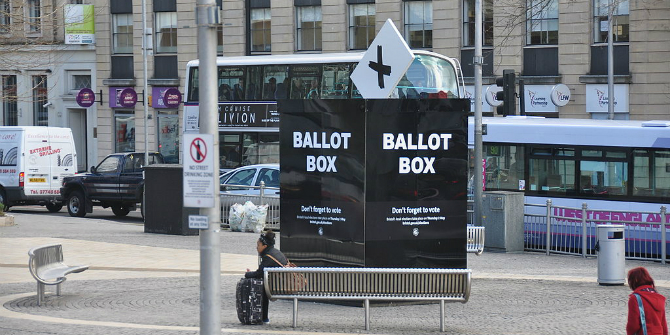 What is to be done to end the Brexit civil war? Nicholas Westcott (Royal African Society) outlines the state of political play after the European Parliament elections. He argues that no solution can be found without an election or another referendum, and that any future majority will need to be found through a coalition of the like-minded.
What is to be done to end the Brexit civil war? Nicholas Westcott (Royal African Society) outlines the state of political play after the European Parliament elections. He argues that no solution can be found without an election or another referendum, and that any future majority will need to be found through a coalition of the like-minded.
What the EP elections reveal is the extent to which this country is now in thrall to a political civil war between Leavers, who are determined to exit the EU at whatever cost because they hate it, the status quo doesn’t work for them, and they feel their vote to leave it is being ignored; and Remainers, who think that to abandon the EU will be a disaster for the country (and themselves) economically, politically – in terms of undermining the Union – and for Britain’s international influence, which is already draining away. Three things mean that all established parties have to fundamentally (and swiftly) rethink their political philosophy – if they are to have any chance of forming a government in the future.
Firstly, the middle ground has been cut away – a soft Brexit will no longer satisfy either camp. It is possible that with a more carefully considered strategy, more skillful political tactics and a more inclusive approach – marginalising rather than trying to woo the hardline Tory eurosceptics, wooing rather than alienating the Labour moderates – a Conservative Prime Minister could have constructed a coalition to accept something on the lines of the Withdrawal Agreement, which was well-negotiated to be the hardest possible exit that doesn’t do fundamental economic damage to the country. But even that left open the major questions about the future relationship, so the political conflict would have continued.
Secondly, traditional party loyalties to Labour and Conservative have been shattered. This has not yet sunk in. But the lesson of May’s premiership is, to adopt the Biblical saying, that ‘whosoever seeks to save their party will lose it’. Both May and Corbyn – and their senior advisers – are ideological prisoners of a past where Labour and Conservative are the natural parties of government and most voters will loyally stick with them. Both have sought a position that will unite their Leave and Remain supporters. But it is impossible. They will have to take sides.

The Conservatives have nowhere to go but to become a party of hard Brexit, because that is what their grassroots membership want. The Tory moderates have lost the battle for the party’s soul. Traditional loyalty, combined with fear of Corbyn, may make them stay and fight for the party they love. But they will lose again. Voters see a party captured by hard Brexiteers, and Remainers will no longer vote for them. And without a hard Brexit policy, the grassroots will vote for Mr Farage instead.
Labour have options, but not under the current leader. He is no longer trusted by the public. The momentum of the 2017 election has been dissipated by his inability to respond to the challenges of anti-Semitism and Brexit. Many voters like Labour’s social progressivism and determination to tackle Britain’s enduring poverty, but it is overshadowed by Brexit. Even were Corbyn to come out unequivocally in support of a second referendum and Remain, moderate voters and businesses will still be reluctant to trust him. Whether Labour can remove their leader without losing their left-wing supporters, is an open question. But without a change and a clear pro-Remain policy, they will lose voters to both the Brexit Party and to the Lib Dems and Greens.
The Liberal Democrats have the greatest opportunity as the unequivocal voice of Remain but currently lack the leadership, strategy or political imagination to seize the moment. If they can find it, they still need a far more compelling narrative to challenge the Brexiteers, because the battle is no longer over the kind of Brexit, but between no deal and no Brexit. Such a narrative could include the following elements:
- The referendum showed a slim majority to leave, but did not define how to leave, when to leave, or where to leave There is no agreement on any of these points, and we cannot leave until there is.
- There remain urgent challenges of social injustice, poverty, inequality and neglect in this country that must be tackled.
- Brexit will not solve any of these – in fact, will make them worse. And no deal would be an unequivocal disaster.
- Only membership of the EU gives us the economic tools and access to markets to tackle them.
- And only membership will ensure that the UK stays united and has control over its future, respect in the world, and security from those people and global trends (like climate change) that threaten us. Leaving would mean throwing away control, not taking it back.
- So dynamic EU membership – helping it reform – is the best way forward.
The Brexit Party’s great strength is that it has no programme beyond exit. This has been Farage’s skill all along – to create a platform, in the referendum and the EP elections, onto which everyone can project their own fantasies. It has worked, brilliantly, and can only be combated by a more convincing rival vision, not simply by facts.
Thirdly, the ideological divide has changed. It is no longer between a traditional right, left and centre on the basis of economic and social policy. It is, as Tony Blair predicted, between open and closed models of society. Do we look to solve our own problems by ourselves? Or do we look to work with other countries to solve them?
In fact, we can already see what a post-Brexit ‘global Britain’ would look like, as we are living through it now. The last two years have shown clearly what Brexit Britain will be like – politically divided, with a feeble government, a weakening economy and declining international influence, effectively no longer in control of our own destiny. A no-deal Brexit will merely amplify it. With the EP elections, the current Parliament has lost legitimacy, dominated by two major parties both riven with contradictions and unable to agree a policy or take decisions on Brexit. No turkeys like to vote for Christmas, but no solution to the civil war can be found without an election or another referendum; and a successor Parliament is likely to see no single party majority, even under a first past the post system. So a majority will need to be found through a coalition of the like-minded. Time to start working on it.
This post represents the views of the author and not those of the Brexit blog, nor the LSE. Image by Nilfanion, licensed under the Creative Commons Attribution-Share Alike 4.0 International.
Dr Nicholas Westcott is Director of the Royal African Society and Research Associate of the Centre for International Studies and Diplomacy at SOAS. He was formerly Managing Director for Africa and for the Middle East in the EU’s External Action Service, and served 30 years in the Foreign and Commonwealth Office prior to that. He holds a PhD in African history from Cambridge University.







Totally agree we need to shift from the narrow political focus on Brexit that is consuming our resources and will continue to consume our resources if we actually leave the EU, to one that addresses the many issues that are doing harm to the UK. If we don’t leave there will be complaints, but at least we can re-focus and address the issues that are harming many in the UK. Addressing them will be hard work, but at least it will improve peoples lives and if successfully addressed may shift public opinion. My concern is that coalitions and collaboration are something UK politicians and public are ill-equipped for after centuries of first-past the post winner takes all politics. That said, the politicians who want to deliver hard-Brexit should realise that they will blamed for every harm Brexit does to the UK and become unelectable as the pain of Brexit drags on year-after-year as we continue in an uncertain post-Brexit state as we re-negotiate our position in the World arena.